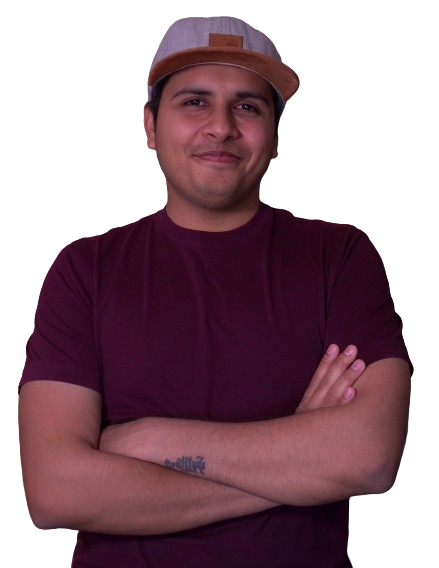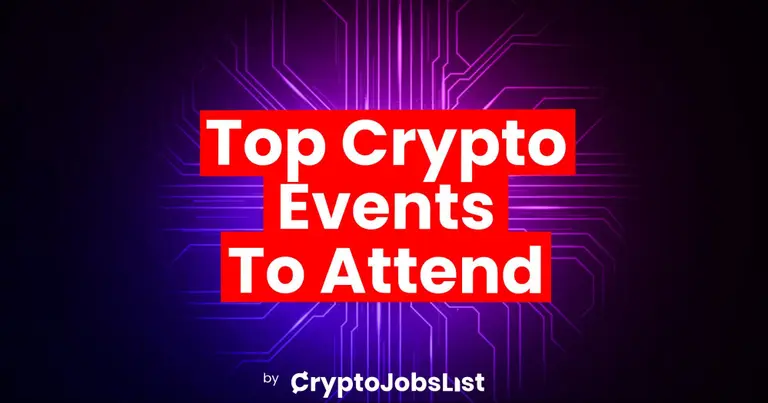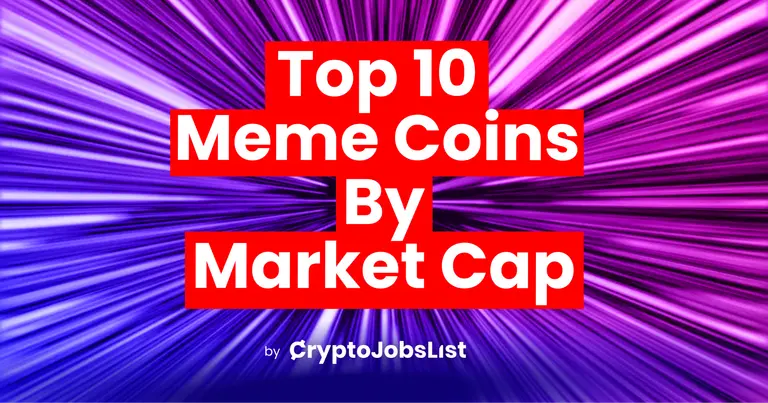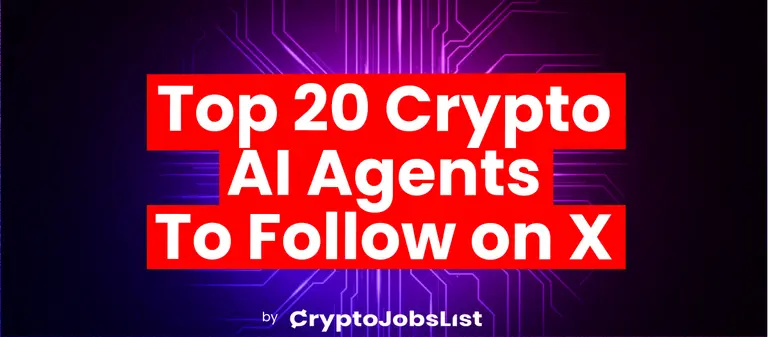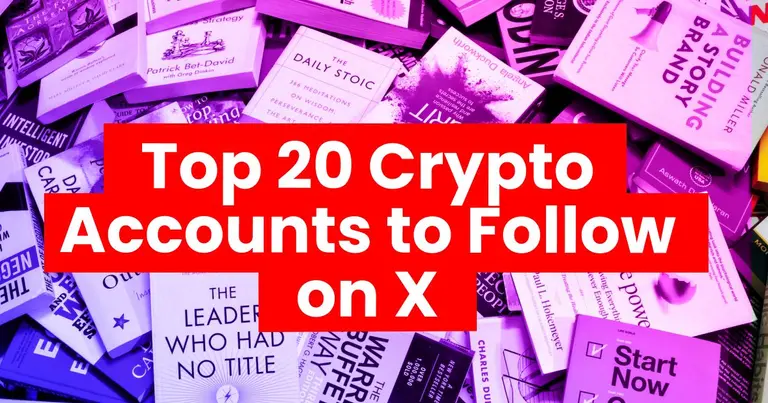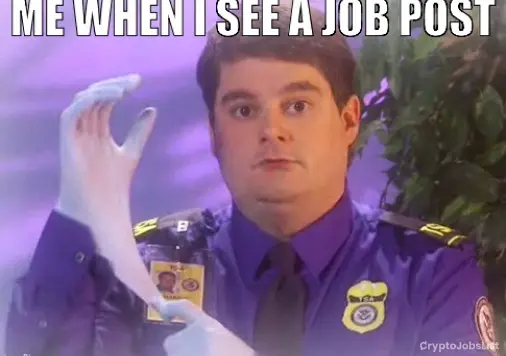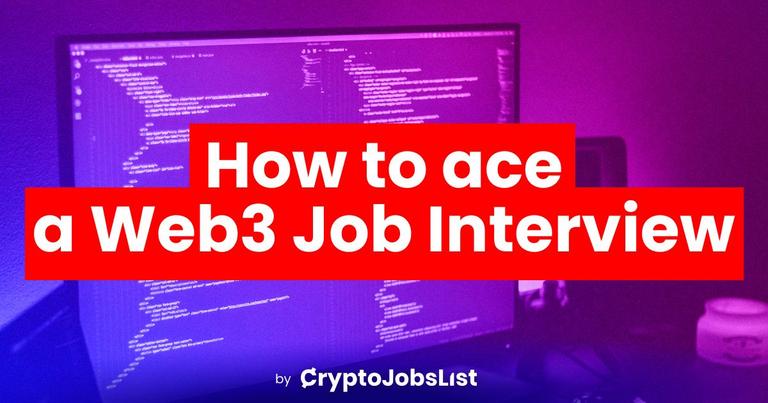Key Takeaways:
- Master essential skills such as blockchain knowledge, community engagement, and marketing.
- Understand the role and responsibilities of a crypto community manager, including key skills and career roadmap.
- Learn to address common interview questions with a focus on real-world experience over theoretical knowledge.
- Develop strategies for effective communication, conflict resolution, and stakeholder management in the crypto community.
- Emphasize the importance of staying informed about industry trends and competitor activities to succeed as a community manager.
If you're in search of a crypto community manager job or need guidance on hiring one, this article offers crucial questions and answers that will simplify the process for you.
Web3 and crypto community managers are referred to as the backbone of projects. In crypto, it is not just the product that holds importance over anything else. The product and community hold an almost equal weightage in the success quotient of a crypto project.
Web3 community managers are responsible for building a community of active users, investors, developers, and other stakeholders. Their primary job focus is to promote the community, attract more people to the ecosystem, increase engagement, and create a vibrant community experience.
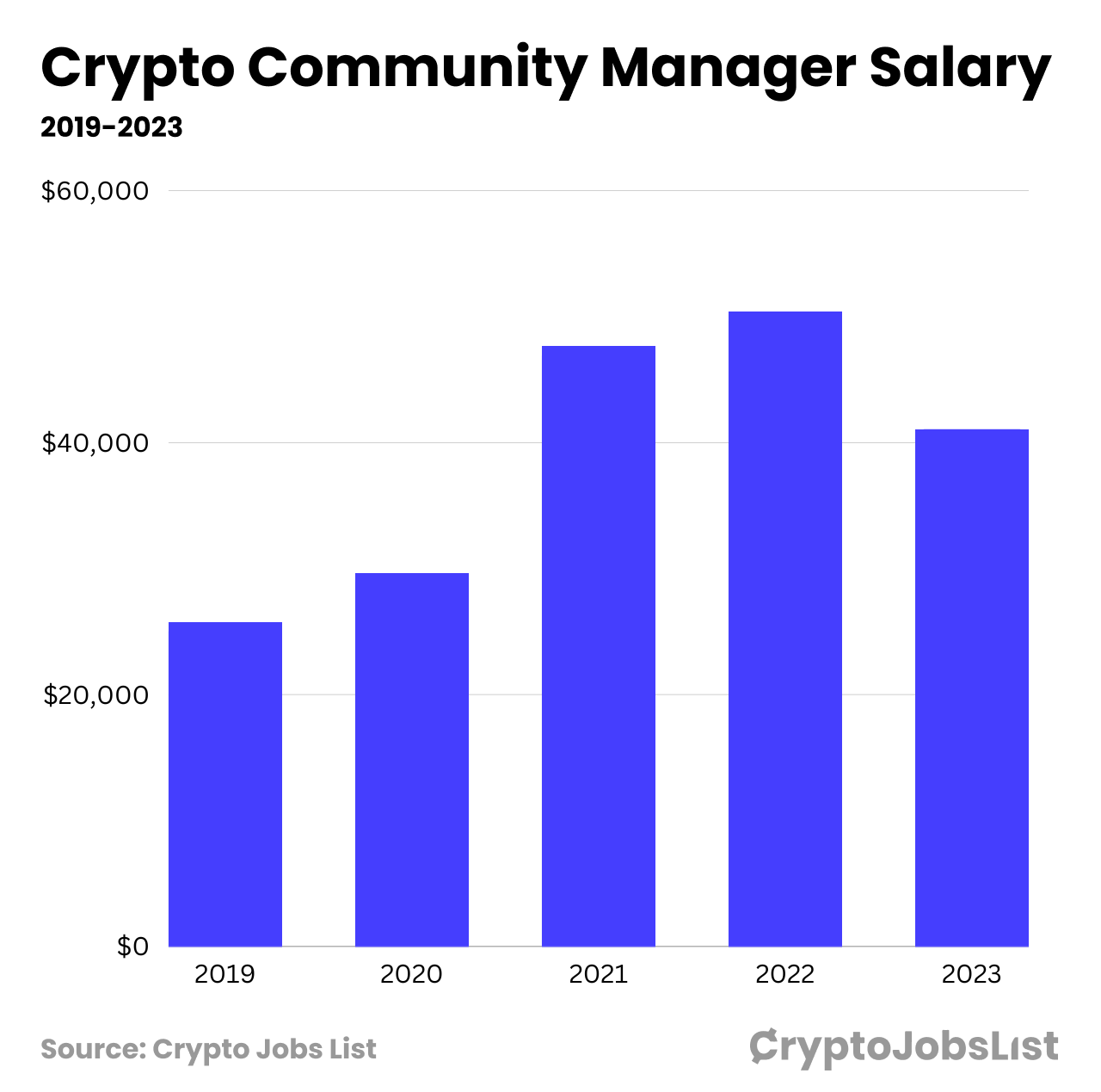
Crypto community managers globally are getting paid an average of $46,593 per year with the top 10% of community managers in crypto making about $90k.
What Is the Role of a Community Manager in Crypto?
Our goal with this article is simple: to give you some of the most asked questions and a guide to structuring your answer for each question to help you crack that interview!
We’re sharing some key skills that you’d need to master as well, think of being great at these skills as a hygiene factor.
If you’d like to dive into the career roadmap of a crypto community manager we wrote an in-depth article on this so make sure to check it out if you’re serious about this.
Key Skills for Web3 and Crypto Community Managers
As a crypto community manager, you will need a diverse set of skills to be effective at what you’re going to do.
Ideally, you must understand blockchain, defi, and crypto in depth and hold some understanding or experience in building and engaging online communities.
An experience around keeping people happy(customer success roles) is also helpful in allowing you to do your job well within the community.
Alright, let’s dive in.
Basics of Blockchain
A good understanding of crypto is imperative for any community manager in the crypto space.
They should understand the basics of how blockchain works, including concepts such as smart contracts, dapps, consensus mechanisms, liquidity pools, etc.
Communication Skills
A great community manager should be amazing at communicating, which means they should be able to take concepts that are hard for people to understand and make them easy and quick to understand.
Negotiation and problem-solving skills are also an important part of the overall communication skill set which comes in handy!
Basics of Marketing and Branding
Community managers should also understand the best practices of how marketing campaigns are built, including testing, execution, and iteration principles.
Ideally, they should also understand the ins and outs of modern content creation, online presence, and promotion strategies on various social media platforms.
We know this isn’t an exhaustive list but these are still the trifecta that’s going to be the most important when you aim to become an ideal candidate as a community manager in the web3 space.
Moving on to our interview questions and answers!
List of Top Community Manager Interview Questions and Sample Answers
Once again these are definitely all the questions that exist on the planet that an interviewer can ask a crypto community management candidate but these are the most common ones.
So if not anything else make sure to understand these questions and why they are asked in the first place.
Rather than trying to memorize these answers, try to understand what the interviewer wants to know about you from each of these questions and you’ll be able to navigate your interviews without getting surprised.
1. How did you get into crypto?
Share your story of how you discovered crypto and why you are sticking around with it enough to consider a career in crypto.
2. How does Bitcoin work? (This could also be asked as how crypto works, how much do you understand about blockchain)
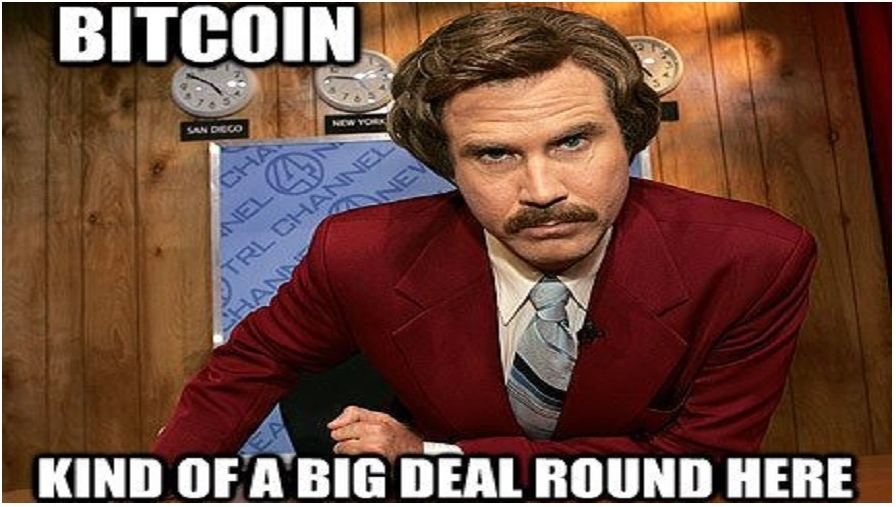
You’re expected to give a high-level explanation of how blockchain works and you can include concepts such as decentralization, consensus, wallets and security, etc.
3. Can you give an example of how you’ve built and managed a community before?
A lot of people think that they need to have a community of tens of thousands but the answer is no.
If you’ve built a community or an engaged group of 15-20 people who you found on the internet this can count. The interviewer does not expect you to have built a community with tens of thousands of people.
They want to understand your management skills on how you go about gathering a group of people and what you do to keep them “active”. Retention is a bigger challenge for projects than acquisition these days.
4. How do you keep up with the latest developments and trends in the crypto space?
This is a very common question and as a community manager you’re simply expected to be on top of whatever is happening in the crypto space.
You can share Telegram and Twitter profiles that you subscribe to as well as YouTube channels along with the websites you surf to get your daily dose of crypto awesomeness.
5. What specific strategies have you used to grow and engage a community?
The interviewer expects a high level picture of various strategies that you might have used in the past such as virtual and real life events, marketing campaigns, creating content, or incentivizing participation etc.
6.How do you measure the success of a community building campaign?
Explain how campaign structure influences the KPIs such as tracking community engagement metrics, user feedback, or direct conversions.
7. Have you ever dealt with a negative or difficult community member? How did you handle the situation?
A big part of a community manager’s job is to connect with the community. It is to represent the project but also build relationships with the people so they feel a part of something bigger.
Some people are definitely not going to be happy and the interviewer expects you to take them through either a situation where this happened or share your thought process on how you would mediate and get a difficult community member to calm down.
8. Can you describe a time when you had to make a tough decision as a community manager?
This is a question that is used for all job role interviews and as with the previous one this one also is asked to gauge your patience and conflict resolution abilities.
You can share tactical pointers that you have used or could possibly use such as deciding to ban a community member or changing the community interaction guidelines or even pivoting the complete project roadmap.
Discuss the thought process and reasoning behind the decision and your role in it.
9. How do you handle conflicts within a community?
This is not the same as dealing with a negative community member.
Sometimes you’d come across situations where community members among themselves don’t agree on certain things(very common in crypto because people love the projects that they are part of).
Share how you approach conflict resolution within community members, such as actively listening to both sides, seeking common ground, and finding a solution that meets everyone's needs.
10. How do you balance the needs and expectations of different stakeholders, such as users, investors, and developers?
A community manager in crypto is the closest person to the actual users. So you know what the developers and the team are thinking about while also knowing quite well what the community is expecting and wants.
Share how you prioritize the needs of such stakeholders and find a balance that aligns with the project's goals.
11. How do you handle feedback from the community, especially negative feedback?
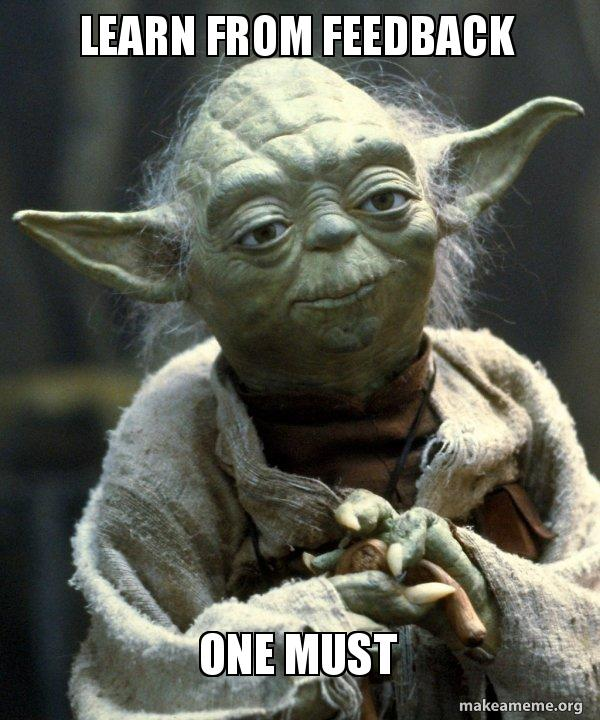
Most of the times the feedback from the community is directed towards the project as a whole but sometimes you’ll get feedback that is aimed at you.
Share your approach on how you’d handle such feedback from the community and plan changes based on that.
12. How do you handle sensitive information and maintain confidentiality within a community?
You won’t get this question often but when you do it will be extremely important for the team to understand the security and confidentiality protocols you have in place for yourself.
13. How do you approach creating a brand identity and voice for a web3 or crypto project?
You’re mostly not expected to create brand guidelines as a community manager but understanding the process behind them and their interpretation will make sure that you are consistent with the brand voice and identity when creating content and interacting with the community!
Share your experience in creating/interacting with brand identity and voice efforts for a web3 or crypto project, including the research and analysis conducted and the strategies used to ensure the brand resonates with the target audience.(if you were a part of this effort)
14. What social media channels do you think are most effective for building a web3 or crypto community?
One of the most important questions you’ll get as a community manager.
Share your experience with different social media channels and which ones you believe are most effective for building a web3 or crypto community.
If you can share some metrics to back your claims it's golden!
15. How do you stay aware of competing projects or organizations in the web3 and crypto space?
Share the resources you use to stay up-to-date on competing projects in the crypto space, such as industry news, research reports, social media, newsletters, etc.
16. How do you build trust with the community and maintain transparency in project communication?
Share your approach to building trust with the community, including transparency in project communication, regular updates, and open channels for feedback and discussion.
As an example, regular AMAs are very helpful for crypto projects to get user feedback quickly and often in a product life cycle.
17. Can you provide an example of how you’ve leveraged data and analytics to inform community building strategies?
Crypto is 100% data and using data and analytics is paramount to make better decisions.
Share an example of how you leveraged analytics to better your community growth strategies, while sharing the exact insights that made you implement those changes.
Frequently Asked Questions
Q1. How do I prepare for a community relations interview?
To prepare for a community relations interview, research the organization thoroughly to understand its community guidelines, impact, and values. Practice answers to common questions that highlight your experience in managing community initiatives and your ability to engage effectively with members of the community.
Q2. What makes a successful community manager?
A successful community manager is adept at building and nurturing relationships, has excellent communication skills, and possesses strong problem-solving abilities that can help improve the community. They must also be proactive in adapting to new tools and trends to keep the community engaged and aligned with the organization's goals.
Q3. What are the most important aspects of community management?
Effective communication, engagement strategies, and performance measurement are vital aspects of community management. A skilled community manager focuses on building trust and rapport within the community, implementing engagement tactics that encourage active participation, and using analytics to refine strategies and demonstrate impact.
Wrapping up
Community management in crypto is a diverse role and involves a mix of many disciplines.
This is what makes it hard but also highly valuable to the projects out there.
To succeed, you need a broad set of skills and experience, including knowledge of blockchain, community management, communication, marketing and branding, strategic thinking, data analysis, and much more!
The questions we have shared here are more or less just a starting point to guide you in the right direction, helping you become a successful community manager candidate and ace any hiring process.
Additionally, it is important to ask the right questions so you can understand the project culture, the values of the team, and more.
This will allow you to be more efficient and better at your job when and if you join that company.
Good luck with your community manager job search!


